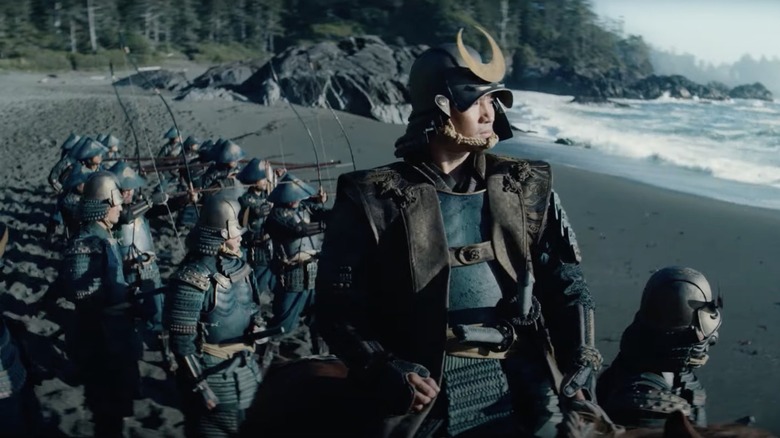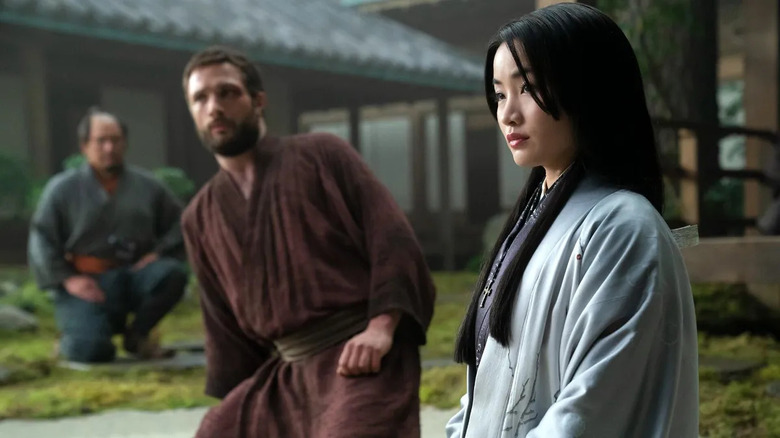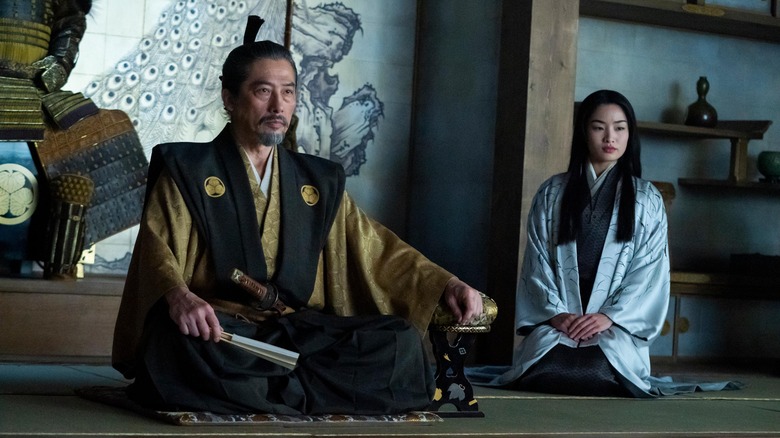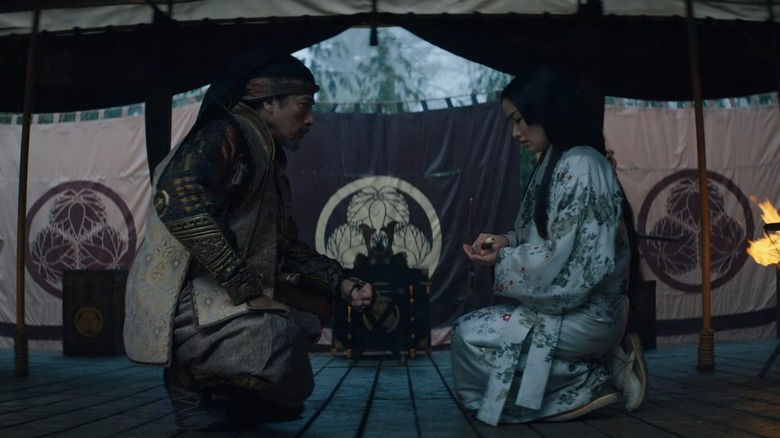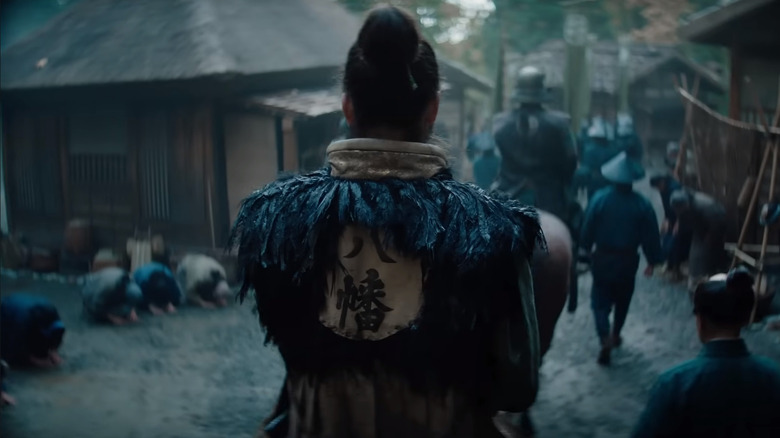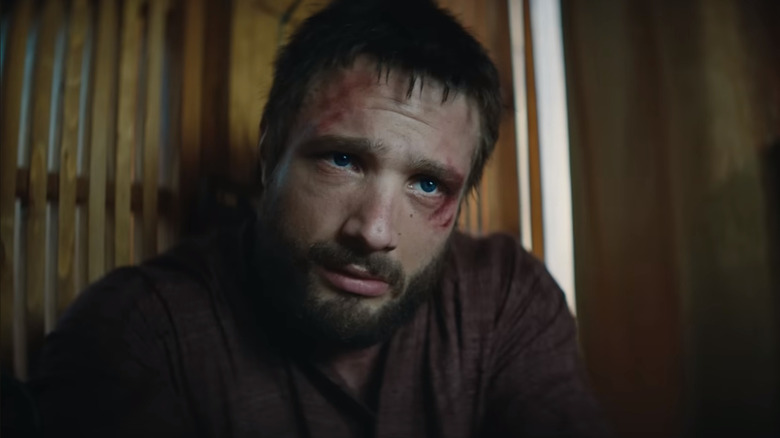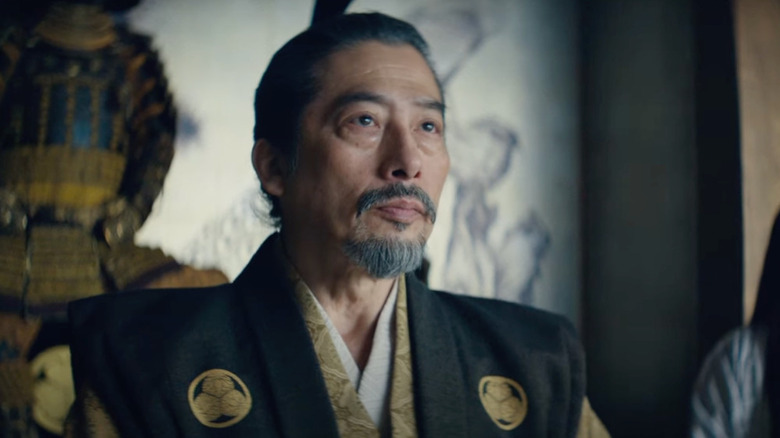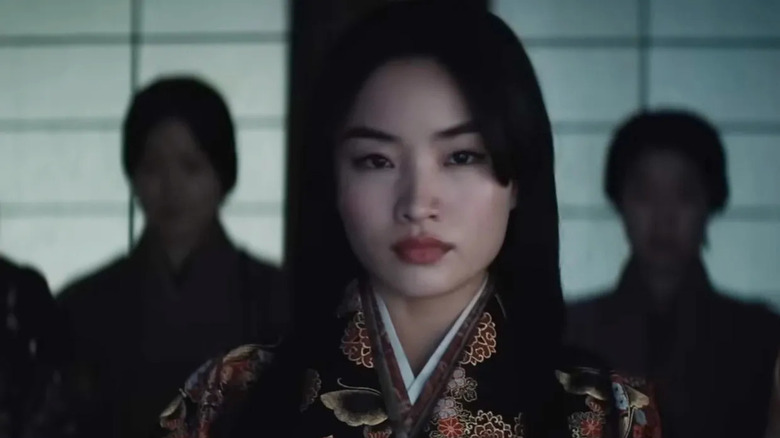7 Biggest Changes The Shogun Premiere Makes From The Book
This post contains spoilers for the "Shōgun" two-part premiere, as well as for the first three hundred pages of the novel "Shōgun" by James Clavell.
There's no such thing as a 100% faithful adaptation, nor should there be. Different mediums have different strengths and limitations, so anyone adapting a book into a TV show should be prepared from the start to lean into those differences. Trying to be too faithful often leads to a show just recreating the same old thing but worse, whereas directors and writers would be better off having the courage to put their own spin on the material.
How does "Shōgun" handle the challenges of adaptation so far? Its two-part premiere has sped through 300 pages of book material, so most of its changes can be chalked up to necessary streamlining. The show's gotten plenty of "Game of Thrones" comparisons by critics already, and with its competent episodic handling of an epic multiple-POV novel, it's easy to see why.
Still, there are plenty of changes that have been done for reasons more complicated than just length, and they all have some interesting implications for where the show is heading. Here are seven of the most significant changes the FX series has made so far, and what they tell us about the showrunner's intentions for the series.
1. A lot less culture shock
In the book, Blackthorne's first interaction with the Japanese is not a confused brawl on his own ship. Instead, it's his scene later in the episode where he wakes up naked in a Japanese house, greeted by a woman who doesn't understand a word he's saying. The conversation he has with her is typical of most of Blackthorne's interactions with the Japanese characters throughout the first hundred pages or so, in that it takes a tremendous deal of effort for him to communicate basic ideas to them. He constantly fails to understand what they're doing or why.
The first few hundred pages are also filled with moments where Blackthorne's value system clashes with the Samurai's value system. Blackthorne doesn't understand the Samurai's apparent lack of regard for their own lives, and the Samurai don't understand why certain things don't shame Blackthorne as much as they should. In the book, Blackthorne isn't forced down while Omi urinates on him like in the show; he willingly lets him do it, because he thinks enduring it will spare the life of someone in his crew. Omi doesn't understand how any man could just move on from being the subject of such a humiliating act. Blackthorne does indeed hold a grudge about the whole thing, of course, but it doesn't bother him as much as Omi expected.
Blackthorne is also repeatedly thrown off by the Japanese's lack of shame around nudity, and the Japanese don't understand why Blackthorne is so reluctant to take a bath. The show addresses this last bit near the end of the second episode, but the book makes it clear earlier and far more often: for the first two hundred pages at least, Blackthorne and the rest of his crew smell like s**t.
2. A less prominent language barrier
Beyond a different understanding of moral values, the show has really glossed over just how agonizing it is to not know what anyone around you is saying at any moment. So much time in the book is centered around linguistic misunderstandings — it's a constant source of conflict, but the overbearing nature of it also helps make Blackthorne's development feel more satisfying. It's fun to watch him slowly but surely get the hang of the language over the course of a thousand pages.
It's not clear if it'll be fun in the show, though, because so far Blackthorne's had a much better grip on what's going on than he probably should. There are several points in the first two episodes where Blackthorne communicates an idea to a Samurai by saying some words in English and gesturing broadly, and the Samurai in question seems to intuit what this means far more easily than they would in the book.
Also worth noting is that the show has chosen to narrow down the languages spoken to just English and Japanese. Blackthorne, Mariko, and the European characters do still speak Portuguese and Latin to each other, but it's automatically translated for the audience, rather than subtitled. It's a very understandable decision — good luck finding a bunch of actors who can effectively perform in three separate languages, one of which has been arguably dead for centuries — but it might lead to some complications down the road. In particular, there's a sneaky exchange involving Latin that might play out in the third episode; it'll be interesting to see how the show handles it when the actors aren't literally speaking Latin.
3. We're introduced to Toranaga much earlier
Although the broad strokes of Toranaga's storyline is unchanged, the show makes a pretty major revision by cutting to him early in the first episode. Before he and Blackthorne's storylines begin to converge, we're already introduced to him navigating some complicated Japanese politics. It's a change that gives new viewers a strong idea of what this series will be about; "Shōgun" the book has a heavy focus on the uneasy alliance between Blackthorne and Toranaga, but it takes a while for that to be clear to readers. With the show's jumping into Toranaga's situation straight away, it much more clearly establishes him, Mariko, and Blackthorne as the story's core trio.
It's a sensible choice, although it also undermines the sense of disorientation Blackthorne is feeling. The book does a really smart job of introducing Blackthorne to lower-level Samurai, making them seem like a big scary presence, but then introducing that Samurai's superior. Yabu seems like the main Japanese viewpoint in the beginning, for instance, only for the introduction of Toranaga to recontextualize this impression. Author James Clavell took the world-building approach of starting small and simple, then gradually expanding outward; the show starts big and complicated straight away.
4. A lot less Seppuku
Another example of the downplayed culture clash is the show's slight de-emphasis on the Samurai's general disregard for life. The act of Seppuku, which is when a Samurai dies by suicide to atone for a shameful mistake, is done in the book with an excessiveness that borders on absurdity. In the book's sequence where Yabu is struggling to rescue the Spanish pilot Rodrigues in the water, one of his soldiers throws himself off a cliff (to his death!) just to maybe get his boss's attention.
Likewise, after the failed assassination attempt at the end of the second episode, book Toranaga orders most of his men to commit seppuku for their failure to stop the spy from getting as far as they did, even though the spy seemed incredibly competent and was still stopped before he could kill his target. Seppuku is portrayed so casually in the book that it strains some credulity; ethics aside, how are there even any Samurai left if they're killing themselves this quickly, over seemingly every minor offense? Wouldn't it be more efficient for everyone if people could just learn from their mistakes, instead of being replaced after a single slip-up?
Most historians agree that while Seppuku was certainly a significant, honored custom in Feudal Japan, and that suicide rates are still a major problem in the country today, the book's portrayal is indeed exaggerated for dramatic purposes. This is a story about people from different cultures learning to understand and respect one another, so by heavily emphasizing the harsher aspects of the Samurai early on, Clavell makes the journey to bridge the cultural divide as difficult as possible. Although the show still includes plenty of Seppuku in its premiere, it still seems tame compared to its source material.
5. Blackthorne: slightly less devious
One seemingly small change the show makes is that when Blackthorne meets the Spanish priest in the jail cell, he tells him upfront that he's English. The show has the two immediately move past this difference in nationality, becoming good friends within their short stint together.
Book fans might be disappointed by this choice, because this is one of Blackthorne's most quietly devious moments. In the book, the priest is old and sickly, and he talks to Blackthorne under the false impression that he's talking to a fellow Spaniard, not a member of the country Spain's currently at war with. Under this false guise, Blackthorne lets the priest tell him all about the political situation in Japan, information that the priest might not have given him if he'd had a better idea of exactly who he was talking to. This is one of many of Blackthorne's lies over the course of the novel; he's constantly stretching the truth to improve his position, and most of the time he gets away with it.
In general, Blackthorne's flaws seem a lot more toned down in the TV version of the story. In the book, the source of his disgust with Japanese culture ranges from fairly reasonable (like when he watches Yabu decapitate a guy for seemingly no reason) to a character flaw on his end, like when he freaks out over the relative normalcy of homosexuality in Japan, or when he thinks of the Japanese as soulless savages. Book Blackthorne also has a bit of an arrogant, rude streak to him — an unpleasant feature that also makes him a lot more interesting. Show Blackthorne is still meant to be morally ambiguous, but most of his unlikeable moments so far have been tampered down, if not omitted entirely.
6. Toranaga and Yabu, slightly less harsh
Likewise, most of the Samurai characters have had their meaner characteristics toned down. Some of this is just the medium of TV giving viewers far less access to their thoughts, but there have also been some changes in their actions. Yabu's sadistic qualities are given a lot more emphasis in the novel, as is the sheer extent of Toranaga's constant conniving. Granted, book Toranaga also complains about the constant waste of life in Samurai culture, showing some hesitance to order his people to commit Seppuku. Nevertheless, book Toranaga still has a lot more blood on his hands.
Perhaps the biggest display of Samurai cruelty in the novel is the treatment of Blackthorne's crew. The show also has Yabu order the slow boiling of a crewmate, but it skips over the days of mental and physical torture the crew is forced to go through. Not only is Blackthorne trapped in a cellar with his men for an agonizingly long period of time, but the book also makes it clear that the Samurai leaders are incredibly close to killing them all at multiple points. If it weren't for the constant political power games going on before Blackthorne's crew arrived, as well as quite a bit of good luck and timing, Blackthorne would've been dead four or five times within the first 200 pages alone. In the show, the sense of terror Blackthorne's crew feels at the hand of the Samurai is never quite done justice.
7. Mariko seems a lot less happy
Mariko in the book initially seems like a content person, portraying herself as proud of her Samurai ways and comfortable with the role of women in her culture. TV Mariko also presents herself this way, but the show has thrown in some early signs of unhappiness. The scene where she persuades her friend Fujiko not to commit Seppuku is a show-only addition, as is the scene of her praying afterward and asking God to forgive her.
Maybe the biggest change, however, comes in the second episode, which establishes some conflict between Mariko and her husband Buntaro much earlier than it's established in the book. He's portrayed as much more chauvinistic towards her, as well as jealous of the attention she's getting from Toranaga thanks to her translating abilities. It's a choice that seems designed to make her as sympathetic as possible, but it runs the risk of over-simplifying some of the internal conflicts she'll face later on in this story.
There's a pattern with most of these changes from the book: they all serve to make the narrative a little less uncomfortable, and a little more straightforward. Some of this feels like a clear-cut positive, like how it gives the Japanese characters a little more humanity than the book allowed them at this point in the story. But some of it also feels like the show's playing things a little too safe. The novel was never afraid to let its characters do and say ugly things, and that's part of what made these characters feel so realistic. The show's still an impressive adaptation with a lot of promise going into the next eight episodes, but when it comes to letting its characters be as messy and morally ambiguous as they are in the book, let's hope the series has the courage to follow through.
